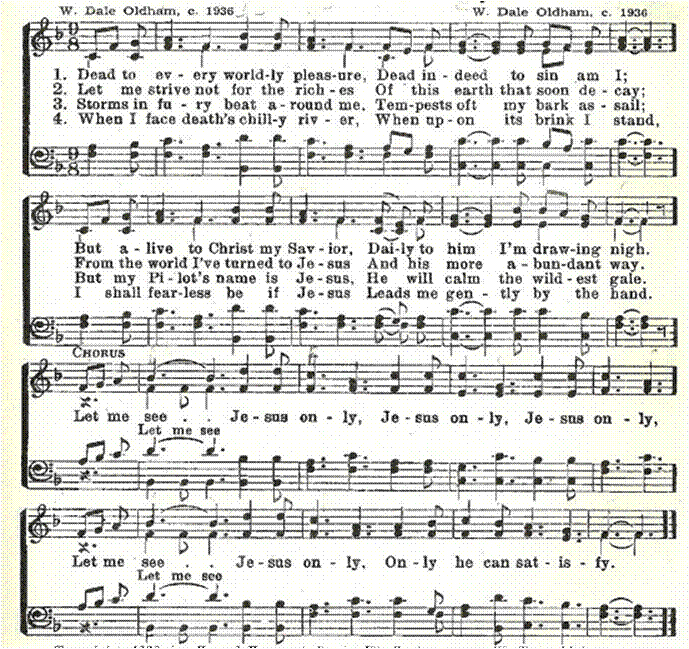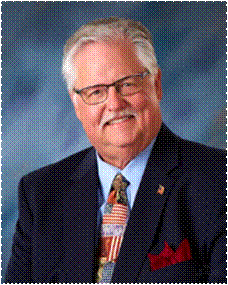|
Heritage Hymn
“LET ME SEE JESUS ONLY” |
|
By Rev. William P. Means Pastor, First Church of God, Lancaster, OH |
|
W. Dale Oldham was born in the tiny community of Ripley, Oklahoma, in 1903, but from such humble beginnings God had a plan. Dale would eventually mature into a gifted pulpiteer, orator, pastor, evangelist, husband, father, radio speaker, poet, lyricist and musician who would one day, according to Rev. Bill Ellis, be recognized by the esteemed Dr. Billy Graham for his innovations in radio ministry combining the genres of music and preaching together into the same program.
Rev. Oldham’s family developed into a musical family so it was no surprise when one of the world’s greatest gospel singers, Doug Oldham, was produced out of that union. Dale has collaborated with Bill Gaither and contributed three selections to the current edition of the 1989 edition of The Hymnal of the Church of God. However, none of his hymns has captured the hearts of church of God people and congregations as has his song, “Let Me See Jesus Only.”
This insightful hymn was written in 1936 in the house of his wife Polly’s mother in Huntington, Indiana. While she and her mother were out shopping and he was at the house alone, God inspired him with two scriptures. They were John 12:21, which says, “The same came therefore to Philip, which was of Bethsaida of Galilee, and desired him, saying, Sir, we would see Jesus”; and Matthew 17:8, which says, “And when they had lifted up their eyes, they saw no man, save Jesus only.” He put these two verses together and came up with this beloved hymn. It was first published in His Praise Anew in 1936. Since then it has been translated into many languages and sung all over the world.
You might say that Rev. Oldham was the first to proclaim that “Jesus is the Subject” before it became our Movement’s slogan. True to the tradition of our Heritage Hymns, Dale Oldham’s composition reflects biblical truths as recognized by the Church of God Reformation Movement.
Let us consider the meaning of each verse. Verse one proclaims: Dead to every worldly pleasure, Dead indeed to sin am I; But alive to Christ my Savior, Daily to Him I’m drawing nigh.
Oldham is praising the virtues of holiness in this particular rhyme. The Apostle Paul encourages the believer thusly, “. . . let us cleanse ourselves from all filthiness of the flesh and spirit, perfecting holiness in the fear of God” (2 Corinthians 7:1 KJV). This is a Church of God Movement doctrinal distinctive that ought to remain paramount in our belief system. The writer of Hebrews proclaims, “Follow peace with all men, and holiness, without which no man shall see the Lord” (Hebrews 12:14 KJV). Oldham was a preacher of holiness and was careful to include its importance in this hymn.
Verse two reads, Let me strive not for the riches Of this earth that soon decay; From the world I’ve turn to Jesus And His more abundant way.
Rev. Oldham is reminding us of the transience of earthly possessions; they are here today and can be gone tomorrow. Jesus reminded us, “But seek ye first the kingdom of God, and His righteousness; and all these things shall be added unto you” (Matthew 6:33 KJV). Jesus also said, "Do not lay up for yourselves treasures on earth, where moth and rust destroy and where thieves break in and steal; but lay up for yourselves treasures in heaven, where neither moth nor rust destroys and where thieves do not break in and steal. For where your treasure is, there your heart will be also” (Matthew 6:19-21 NKJV).
That is exactly the point Rev. Oldham was addressing with this verse. It is foolishness to lose our health trying to gain wealth and then spend our wealth trying to regain our health. Too many people who do not embrace Christianity believe that success is only found in riches. As so many have aptly said, “You can’t take it with you!”
Verse three in its original form states, Storms in fury beat around me, Tempests oft my bark assail; But my Pilot’s name is Jesus, He will calm the wildest gale.
A bark is a ship or sailing vessel. This entire verse was meant to have a nautical connotation. Oldham might have been thinking about how Jesus calmed the sea for the Apostles on more than one occasion, and how He can steady the “ship of our lives” in the same manner.
In the 1989 printing of The Hymnal of the Church of God, the editors altered the term “bark” to “heart,” changing the entire meaning of the verse and amending the nautical sense of the words. By changing that one word it violated the integrity of the hymn both for memorization and by taking away the nautical terminology and the intent of the author. My opinion is that no one should ever change the original words of a hymn for any reason, especially in this case when it is written by one of our stellar pioneers, Rev. W. Dale Oldham. Nonetheless, the meaning is clear. If we trust in Christ, He will take us through the most difficult times of life.
My dad, the late Rev. M. B. Means said his favorite biblical expression was, “And it came to pass. . .” whenever it was found in scripture. I asked him why, and he said, “Because it reminds me that God will always take us through difficult circumstances.” I believe that was the intent of this third verse.
The final verse reads, When I face death’s chilly river, When upon its brink I stand, I shall fearless be if Jesus Leads me gently by the hand.
If Jesus is our Savior then, Rev. Oldham tells us, Jesus removes our fear of death! John, the Apostle of love, reminds us, “There is no fear in love; but perfect love casteth out fear” (1 John 4:18 KJV). We live in a cruel and merciless world, but with Christ in our hearts and by our side, ultimately there is nothing to fear because Jesus is on the other side of death for the Christian!
Then, Oldham’s memorable, singable chorus says, Let me see Jesus only, Jesus only, Jesus only, Let me see Jesus only, Only He can satisfy.
In His Sermon on the Mount Jesus proclaimed, “Blessed are you who hunger now, for you shall be satisfied” (Luke 6: 21 NASV). Our only true satisfaction as human beings is spiritual satisfaction, and it comes from Jesus Christ, the Author and Finisher of our faith!
How thankful I am Rev. Oldham listened to the Holy Spirit as he sat in that house in Indiana way back in 1936. The Church of God Reformation Movement is richer for it and, even though he went to Heaven in 1984, the influence of this great hymn will continue to touch people for the Lord until Jesus returns in glory.
|


|
Heritage Hymn “LET ME SEE JESUS ONLY” |